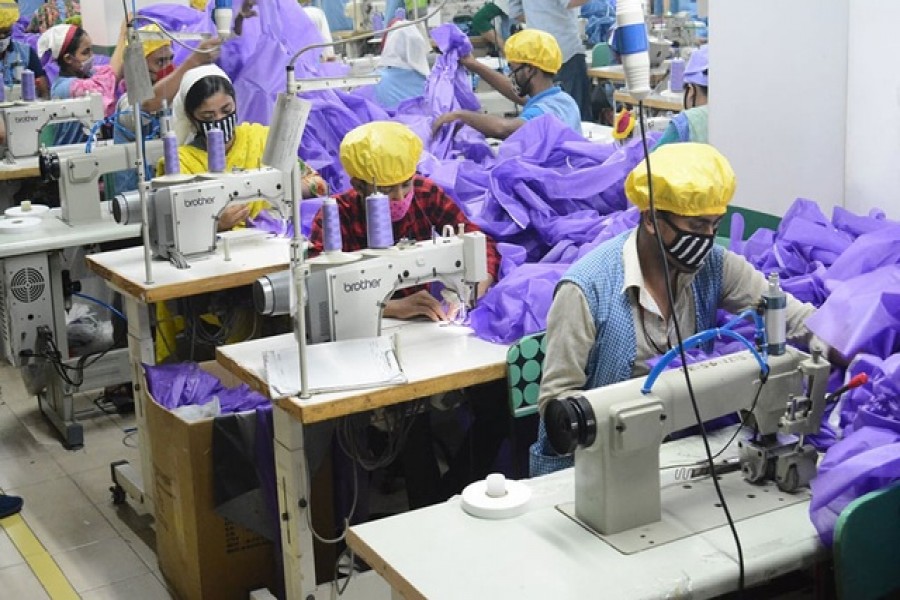Amid confusion for well over a week about opening or continuing to shutter the garment factories, it was finally officially decided not to open. Ever since the corona pandemic began to trigger the panic of contamination in big assemblies, the unease of keeping the country's main manufacturing hub -- the garment factories -- figured as a major issue requiring a well thought-out decision.
Not the factory owners alone, the government too was in a fix. This led to lax and desultory moves, and given the high stakes involved in asking factory owners to shutter down, the government initially opted for wait and see. But the Bangladesh Garment Manufacturers and Exporters Association (BGMEA) faced severe criticism when it attempted to reopen its factories during the second phase of the lockdown. Thousands of workers rushed to the capital and adjacent garment hubs from remote areas of the country amid the countrywide lockdown. But on the next day, they had to go back home when entrepreneurs backtracked on their decision to reopen the factories amid severe criticism.
Subsequently, there was a move from the BGMEA to open the factories on April 26. Cancellation of export orders to the tune of well over US$3.0 billion and fear of further cancellation compounded with the burden of salary payments of workers were too worrying for the entire sector, and opening the factories was the only choice. BGMEA leaders following consultation with the government had announced opening the factories, though maintaining safety of workers and monitoring their health conditions remained the key concern. Finally, the decision got changed. Indeed, it was the safety concern of workers that prompted the BGMEA and BKMEA to stay away from their earlier decision. However, the BGMEA and the BKMEA in the statement said if any factory wanted to stay open for paying salaries to its workers for the month of March, they must seek permission from the associations and industrial police.
On the other hand, the government's Department of Inspection for Factories and Establishments (DIFE) in a statement said factories can be kept open if they had work orders from the international retailers and brands, and the factories which are engaged in production of Personal Protective Equipment, masks and goods related to coronavirus prevention can follow suit.
Observers are of the opinion that the statement of the DIFE allowing factories to remain open if they had export orders may cause confusion as most big factories have orders to execute. Clearly, there is a lack of coordination in deciding on the closure of factories. When workers' safety is the prime concern, reopening factories for whatever reason is not at all a sensible move. It is, however, not known whether there has been any development in this regard lately. The BGMEA, however, on Friday night directed its member factories not to ask workers who are in their villages to return to Dhaka until factory opening date is announced.
For the moment, following the decision of the BGMEA and BKMEA, (and endorsed by the government), garment factories are to remain shut. But for how long? This is a complex question and seeking an answer is not easy. Economists say shutting down the country's major economic activity cannot continue for an indefinite period. Ahsan H Mansur, executive director of the Policy Research Institute, advocated for gradual reopening of the factories, starting from next month. "We have to open the factories as almost all the affected countries have already opened their economies. We will be lagging if we do not open the factories soon," he said, citing that competing countries like China, Vietnam, Cambodia and Turkey have already opened up their economies. However, the health and safety measures should be followed carefully, he said, adding that the factory managements can make preparations for those from now on. For instance, there can be several exit and entry gates in the factories. The workers will enter through one gate and exit through another, a move that can prevent overcrowding. Moreover, regular handwashing and cleaning of floors and washrooms while wearing hand gloves must be enforced, he added.
The BGMEA is considering adopting a staggered approach to open factories in a limited capacity. In the first phase, member factories may be advised to ask only the workers who live nearby their factories to join. But, unfortunately instructions of the parent Association are not being heeded to by some factory owners who have called their workers to work. While some factories are open, and workers have also joined, there prevails a fear among a large majority of workers now away from the cities about their job security. Expressing her reaction to the situation, BGMEA president Rubana Huq said, "None of our members will ask workers to come from outside Dhaka as they have been told that we will not cooperate with them if they don't listen to our guideline that is clear enough on the issue." So, things do not look all right as they seemed only a couple of days ago.
In all fairness, reopening by phases looks like a plausible proposition. While doing so, strict monitoring of health conditions of workers should figure as the foremost concern. A recently formed task force is reportedly preparing a guideline on when and how to reopen the factories. Meanwhile, there is the need to rein in the situation caused by reopening of some factories defying instructions.


